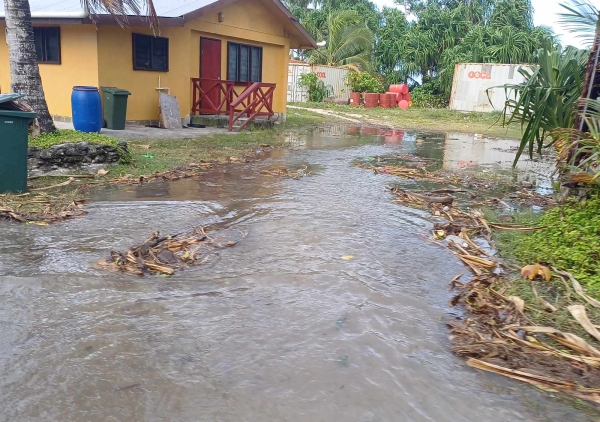The risks posed by climate-related hazards to the water quality and availability, and water infrastructure in Tuvalu were highlighted on the second day of a series of stakeholder workshops hosted as part of the Tuvalu National Adaptation Plan (NAP) Project.
The Tuvalu NAP Project is a three-year, USD$3 million project funded by the Green Climate Fund, and implemented by the Secretariat of the Pacific Regional Environment Programme (SPREP) in partnership with the Commonwealth Scientific, Industrial, and Research Organisation (CSIRO), GHD Consulting, and the Climate Change Department of the Government of Tuvalu.
Dr Fahim Tonmoy, Director of Climate Change and Sustainability at Deloitte , who worked with CSIRO to conduct a Climate Impact, Vulnerability, and Risks Assessment (CIVRA) presented the preliminary findings to the water sector during a consultative workshop with the aim of garnering feedback from the experts working within the sector in Tuvalu.
“Water availability in Tuvalu is currently most impacted by extreme drought which leads to water scarcity causing significant declines in health and affects food security. Saline intrusion from sea level rise also impacts the water quality, as it thins the freshwater lens and reduces groundwater quality,” Dr Tonmoy revealed.
The current risks to water availability identified as major, with up to 70 percent of Tuvalu inhabitants living without access to adequate catchment and storage capacity to face long dry spells, and the limited water having to be shared across domestic and agricultural use putting extra strain on the water supply, causing increased vulnerability to droughts.
Water quality was also identified as being at major risk, with the groundwater supply being generally brackish and not safe for drinking. The cultivation of pulaka is also declining due to saltwater intrusion.
These risks are likely to further increase in 2030, and likely to become extreme in 2050, with direct threats to community health, livelihoods, and food security, as well as the loss of cultural practices.
Ellis Ave, Social and Psycho-social Counsellor with the Social Welfare Department, also identified the psychological impacts of the lack of water on families and individuals, and the desperation which will cause them to resort to extreme measures to get water.
“This is the reality for Tuvaluans when there is a shortage of water. This is because water is life, whether clean or dirty, if you have water, you have life,” she said.
Two major hazards affecting water and waste infrastructure in Tuvalu are coastal inundation (resulting in erosion, saltwater intrusion and septic overflow) and cyclones (resulting in sediment movement, flooding, damage to wastewater infrastructure and desalination plants).
The CIVRA study identified the current risk posed by coastal inundation to water infrastructure as major, due to saltwater intrusion, and flooding causing septic tanks to overflow, and pumps and drains to become blocked by sediments and pollution. This can impact the supply and quality of water, increase maintenance and repair costs, and affect community health and wellbeing.
Number of tropical cyclones are projected to become less, however, their intensity may increase. This along with increasing sea level rise will also pose significant risks to coastal assets and flood defence infrastructure such as sea walls, levies, lagoon protection infrastructure, and coral reefs.
Tropical cyclone-induced storm surges, king tides, and flooding have caused significant damage to Tuvalu’s coastal protection infrastructure over the years and have been identified as a major risk.
These are likely to increase going into 2030, and by 2050 it is expected that 60 percent of Tuvalu’s population will be exposed to coastal inundation under a low emission scenario, and 80 percent under a high emissions scenario. This may result in irreversible damage to coastal and flood defences in the country.
According to Dr Geoff Gooley, CSIRO Project Manager, the aim of presenting the preliminary findings to the sectors before the report is finalised, is to ensure that they cover all the bases and collect any additional information that is not already captured.
“The findings from the CIVRA will be presented to the sectors this week, and we will have discussions to collect their initial feedback on the work that’s been done. This will then be used to develop a comprehensive final CIVRA report which will inform the development of the National Adaptation Plan,” Dr Gooley said.














